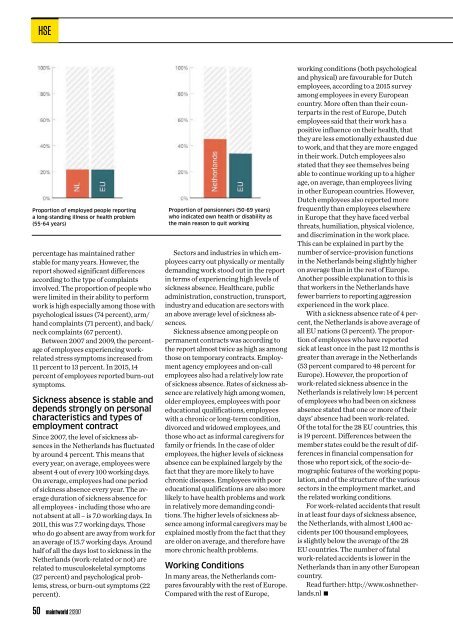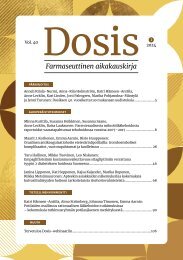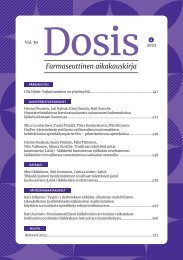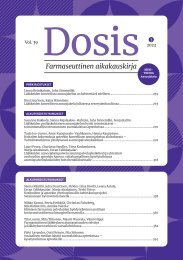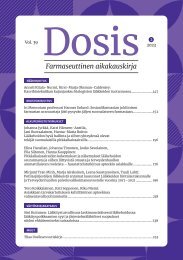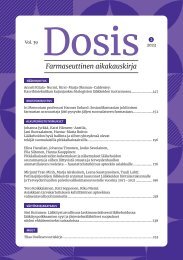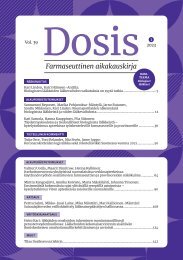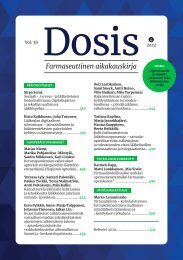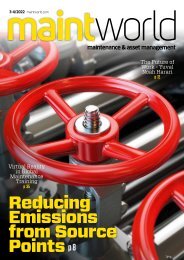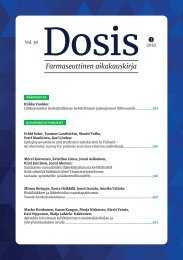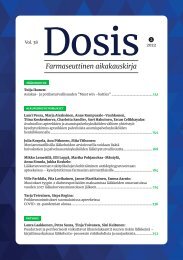Maintworld 2/2017
You also want an ePaper? Increase the reach of your titles
YUMPU automatically turns print PDFs into web optimized ePapers that Google loves.
HSE<br />
Proportion of employed people reporting<br />
a long-standing illness or health problem<br />
(55-64 years)<br />
percentage has maintained rather<br />
stable for many years. However, the<br />
report showed significant differences<br />
according to the type of complaints<br />
involved. The proportion of people who<br />
were limited in their ability to perform<br />
work is high especially among those with<br />
psychological issues (74 percent), arm/<br />
hand complaints (71 percent), and back/<br />
neck complaints (67 percent).<br />
Between 2007 and 2009, the percentage<br />
of employees experiencing workrelated<br />
stress symptoms increased from<br />
11 percent to 13 percent. In 2015, 14<br />
percent of employees reported burn-out<br />
symptoms.<br />
Sickness absence is stable and<br />
depends strongly on personal<br />
characteristics and types of<br />
employment contract<br />
Since 2007, the level of sickness absences<br />
in the Netherlands has fluctuated<br />
by around 4 percent. This means that<br />
every year, on average, employees were<br />
absent 4 out of every 100 working days.<br />
On average, employees had one period<br />
of sickness absence every year. The average<br />
duration of sickness absence for<br />
all employees - including those who are<br />
not absent at all – is 7.0 working days. In<br />
2011, this was 7.7 working days. Those<br />
who do go absent are away from work for<br />
an average of 15.7 working days. Around<br />
half of all the days lost to sickness in the<br />
Netherlands (work-related or not) are<br />
related to musculoskeletal symptoms<br />
(27 percent) and psychological problems,<br />
stress, or burn-out symptoms (22<br />
percent).<br />
50 maintworld 2/<strong>2017</strong><br />
Proportion of pensionners (50-69 years)<br />
who indicated own health or disability as<br />
the main reason to quit working<br />
Sectors and industries in which employees<br />
carry out physically or mentally<br />
demanding work stood out in the report<br />
in terms of experiencing high levels of<br />
sickness absence. Healthcare, public<br />
administration, construction, transport,<br />
industry and education are sectors with<br />
an above average level of sickness absences.<br />
Sickness absence among people on<br />
permanent contracts was according to<br />
the report almost twice as high as among<br />
those on temporary contracts. Employment<br />
agency employees and on-call<br />
employees also had a relatively low rate<br />
of sickness absence. Rates of sickness absence<br />
are relatively high among women,<br />
older employees, employees with poor<br />
educational qualifications, employees<br />
with a chronic or long-term condition,<br />
divorced and widowed employees, and<br />
those who act as informal caregivers for<br />
family or friends. In the case of older<br />
employees, the higher levels of sickness<br />
absence can be explained largely by the<br />
fact that they are more likely to have<br />
chronic diseases. Employees with poor<br />
educational qualifications are also more<br />
likely to have health problems and work<br />
in relatively more demanding conditions.<br />
The higher levels of sickness absence<br />
among informal caregivers may be<br />
explained mostly from the fact that they<br />
are older on average, and therefore have<br />
more chronic health problems.<br />
Working Conditions<br />
In many areas, the Netherlands compares<br />
favourably with the rest of Europe.<br />
Compared with the rest of Europe,<br />
working conditions (both psychological<br />
and physical) are favourable for Dutch<br />
employees, according to a 2015 survey<br />
among employees in every European<br />
country. More often than their counterparts<br />
in the rest of Europe, Dutch<br />
employees said that their work has a<br />
positive influence on their health, that<br />
they are less emotionally exhausted due<br />
to work, and that they are more engaged<br />
in their work. Dutch employees also<br />
stated that they see themselves being<br />
able to continue working up to a higher<br />
age, on average, than employees living<br />
in other European countries. However,<br />
Dutch employees also reported more<br />
frequently than employees elsewhere<br />
in Europe that they have faced verbal<br />
threats, humiliation, physical violence,<br />
and discrimination in the work place.<br />
This can be explained in part by the<br />
number of service-provision functions<br />
in the Netherlands being slightly higher<br />
on average than in the rest of Europe.<br />
Another possible explanation to this is<br />
that workers in the Netherlands have<br />
fewer barriers to reporting aggression<br />
experienced in the work place.<br />
With a sickness absence rate of 4 percent,<br />
the Netherlands is above average of<br />
all EU nations (3 percent). The proportion<br />
of employees who have reported<br />
sick at least once in the past 12 months is<br />
greater than average in the Netherlands<br />
(53 percent compared to 48 percent for<br />
Europe). However, the proportion of<br />
work-related sickness absence in the<br />
Netherlands is relatively low: 14 percent<br />
of employees who had been on sickness<br />
absence stated that one or more of their<br />
days’ absence had been work-related.<br />
Of the total for the 28 EU countries, this<br />
is 19 percent. Differences between the<br />
member states could be the result of differences<br />
in financial compensation for<br />
those who report sick, of the socio-demographic<br />
features of the working population,<br />
and of the structure of the various<br />
sectors in the employment market, and<br />
the related working conditions.<br />
For work-related accidents that result<br />
in at least four days of sickness absence,<br />
the Netherlands, with almost 1,400 accidents<br />
per 100 thousand employees,<br />
is slightly below the average of the 28<br />
EU countries. The number of fatal<br />
work-related accidents is lower in the<br />
Netherlands than in any other European<br />
country.<br />
Read further: http://www.oshnetherlands.nl


